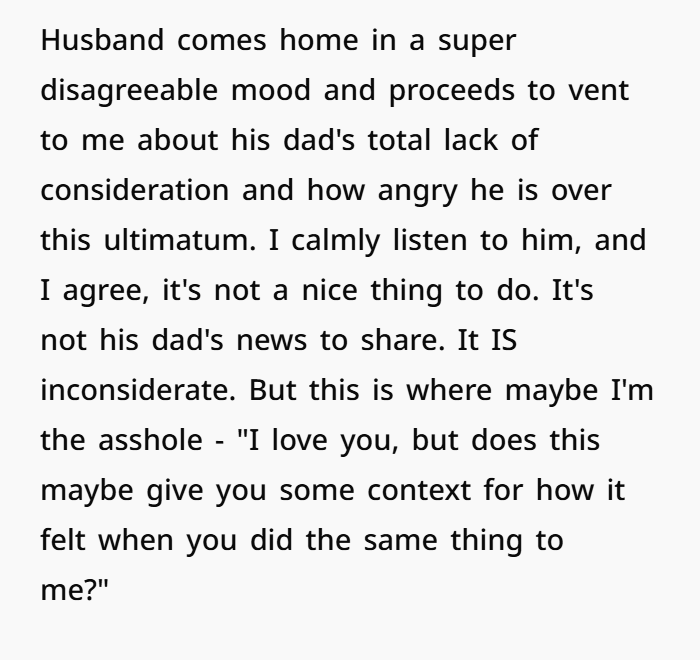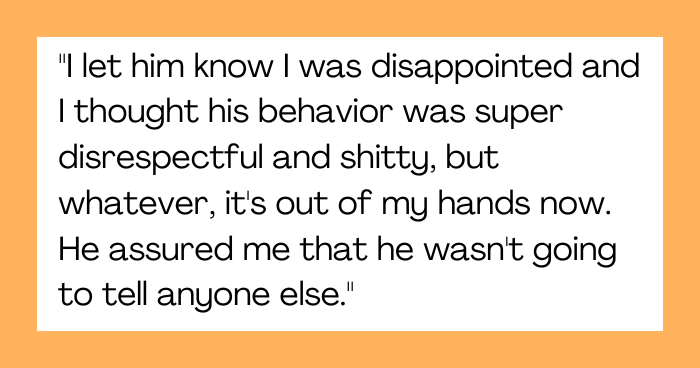Husband Upset Over Boundary Being Crossed, Wife Points Out His Similar Actions—Who’s in the Wrong?
In this story, a wife is pregnant and the husband keeps disrespecting her wish not to tell anyone until she is ready. Even when she was very clear with him about the boundaries, he told coworkers, friends and family members throwing in “but it was for excitement” as a reason. Afterwards, his father went just as far in the opposite direction — threatening to tell the husband’s grandparents about the pregnancy — and he came home looking for sympathy. Wife, who had been wounded by his previous conduct, saw the resemblance and the dispute flared up. He called her selfish, said she was not supporting him, which left her confused as to whether she did something wrong or if her anger was warranted.
The moment you tell someone not to do something, it suddenly just becomes irresistible to them

The author found out she was pregnant, but asked her husband not to mention it for some time, just so they could adjust to the news











Boundaries, Emotional Support, and Reciprocity in Relationships
And to be real, this story is about all the things that are important in a marriage: setting boundaries, supporting one another emotionally, and knowing how an action can affect your spouse. Let us analyze what is behind the dynamic here.
The Importance of Boundaries and Emotional Safety
It is important that partners respect each other and do not violate boundaries, particularly in vulnerable times such as pregnancy, as this is what fosters trust and a sense of emotional safety in the relationship. According to research from The Gottman Institute, which is among the foremost experts on relationships, “Ignoring boundaries can provoke a partner to feel unseen, unheard, and invalidated.” Here, the husband repeatedly crossed a line into the wife’s boundaries and put his need for excitement above her need to have time to herself to process.
This set of behavior to cross boundaries is echoed in his father’s ultimatum. Though the wife conceded that the father’s actions were wrong, she was annoyed that the husband had experienced the same thing she went through—and still couldn’t see the larger picture. Especially when the situation is similar to a previous issue, I think it is legitimate to expect some empathy and reflection.
Emotional Reciprocity and Timing
That may be true, but there are appropriate times to reflect on such matters, and this was not one of them. When her husband came home mad, he may have actually wanted emotional first aid, not a construction paper triangle for his mood. According to experts in conflict resolution like the folks at Psychology Today, what we’ve actually lost sight of is emotional reciprocity: comfort in the moment, redress of grievances later. Which was absolutely true but, the timing might just have made him feel criticized and not supported.
Scolded by her husband for having a “victim mindset”, her husband’s dismissal of her feelings is just as concerning. It takes two to tango when it comes to emotional reciprocity—if he was looking for sympathy for having his boundaries crossed, he should have also extended sympathy to her when he hurt her in the same way.
Navigating Conflict and Moving Forward

Conflict resolution in relationships often hinges on balancing empathy with accountability. Here’s how both parties can work toward resolution:
- For the Wife:
- Validate your husband’s feelings about his father’s actions, acknowledging how upsetting it must feel.
- Once the situation has cooled, revisit the conversation in a non-confrontational way: “When you were upset earlier, it reminded me of how I felt when you shared our news without my consent. Can we talk about how we can avoid situations like this moving forward?”
- For the Husband:
- Reflect on how his own actions may have mirrored his father’s behavior.
- Acknowledge the hurt he caused by disregarding her boundaries and commit to prioritizing her needs in the future.
Both partners need to set clear communication on boundaries, and conflict should be addressed collaboratively, not defensively.
Netizens called the author’s husband out for being a hypocrite and completely unreliable







The wife rightly compared her husband with his father. However, it might be that her timing inhibited her ability to transmit her message. A sentence about holding accountable, without shares on both sidesSeems like the Only healthy couples share empathy and accountability. A two-person relationship requires both parties to reflect freely and communicate — if the dance leads to the wrong music, it needs to be repaired — and never again to be played the same way without major effort!

